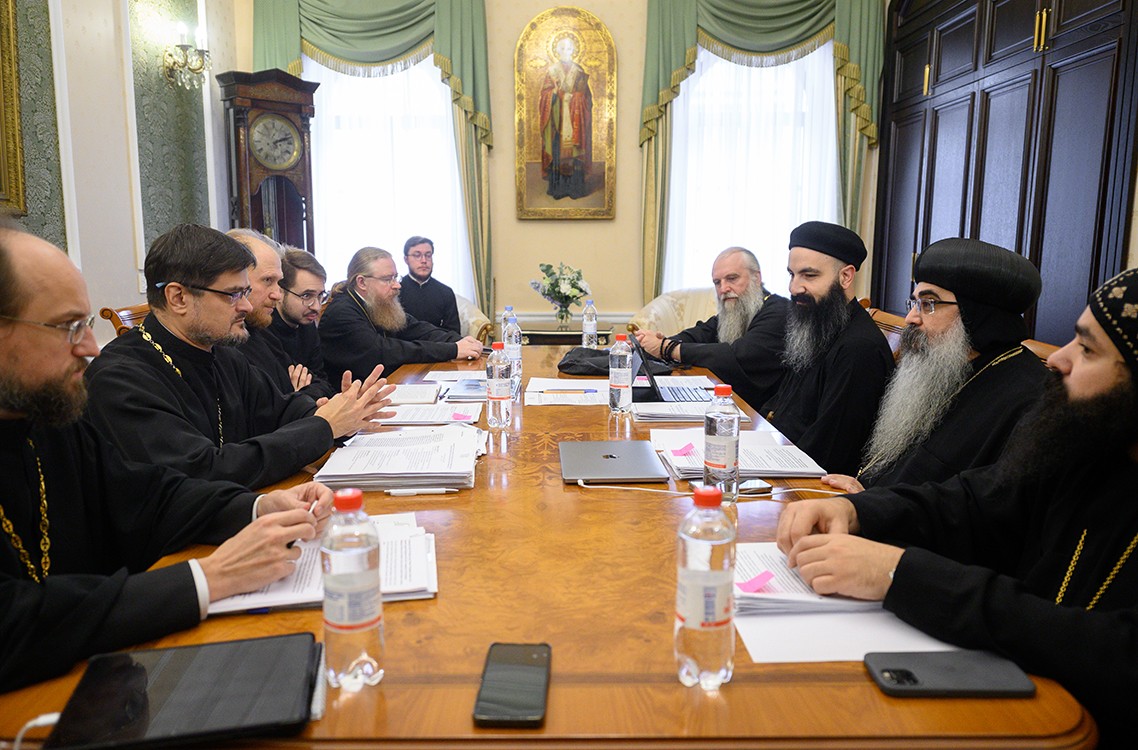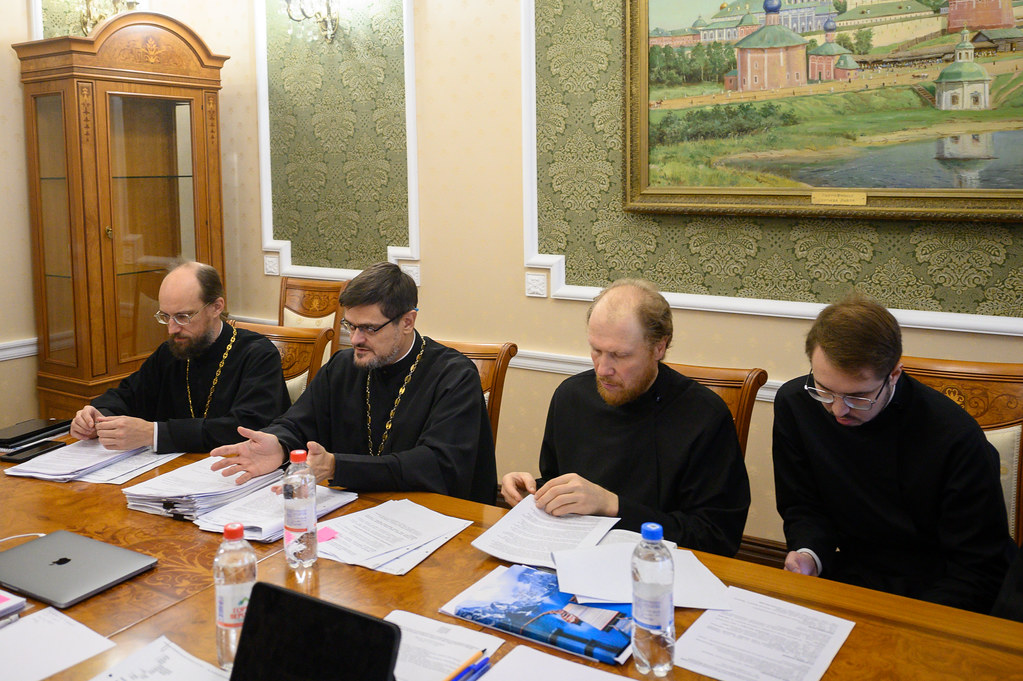
Theological consultations Between the Russian Orthodox Church and the Coptic Orthodox Church began at the Moscow Theological Academy



mospat.ru/
DECR – 19/10/2023
Moscow – Russia: On 17 October 2023, the second round of theological consultations between the Russian Orthodox Church and the Coptic Church began at the Moscow Theological Academy, the press service of the MDA reports . The interviews are taking place with the blessing of His Holiness Patriarch Kirill of Moscow and All Rus’ in accordance with his agreements with the Primate of the Coptic Church, His Holiness Patriarch Tawadros II.
As part of the activities of the commission on bilateral cooperation between the Russian Orthodox Church and the Coptic Church, in 2020 a special working group was established for the development of theological interviews, which included, on the part of the Russian Orthodox Church, the Secretary of the Department for External Church Relations for Inter-Christian Relations, Hieromonk Stefan (Igumnov), Vice-Rector for educational work of the MDA, priest Pavel Lizgunov and the head of the office of oriental studies of the MDA, deacon Sergiy Panteleev. From the side of the Coptic Church, the working group included the vicar of the Los Angeles Metropolis, the rector of the Coptic Theological Academy named after Saints Cyril and Athanasius of Alexandria in the USA, Bishop Kyrillos, the cleric of the Los Angeles Metropolis and the vice-rector of the Coptic Theological Academy named after Saints Cyril and Athanasius of Alexandria, priest Macarius Refela, and also the representative of the Coptic Church in Russia, Hieromonk Daoud el-Antoni.
The experts of the second round of theological consultations from the Moscow Theological Academy were Associate Professor of the Department of Theology Hegumen Adrian (Pashin) and Senior Lecturer of the Department of Philology Hieromonk Theodore (Yulaev).
At the beginning of the working meeting, priest Pavel Lizgunov read out the welcoming speech of the rector of the Moscow Theological Academy and vicar of the Holy Trinity Sergius Lavra, Bishop Kirill of Sergiev Posad and Dmitrov:
“We are glad to see you on the fertile and blessed land of the Holy Trinity – in the Holy Trinity Sergius Lavra, in the Moscow Theological Academy. Our meeting is taking place, on the one hand, during new wars and conflicts in different parts of the world. But, on the other hand, at an inspiring time of expanding contacts between Russia and different parts of the traditional Christian world, especially the countries of Africa. That is why we are all especially glad to see the official delegation of the Coptic Orthodox Church. In our time of apostasy, which is rapidly and aggressively spreading throughout the world, it is especially important to unite the efforts of the Christian world, adhering to traditional values, in order to resist the destructive process of moral degradation and total secularization. Last year, delegations from our Church and our Academy visited Egypt several times. We discussed important issues and established good contacts with the ancient Coptic Church. We have already begun real cooperation in the educational and scientific fields. Communication in the field of theological thought is of particular importance. Unfortunately, the division of our Churches goes deep into past centuries. Our duty to God in these end times is to make every effort to overcome this division, no matter how much effort it takes. The first step in this process is to honestly, accurately, and deeply understand what divides us; what theological terms, formulas and doctrines unite our Churches, and which ones divide them. The only way to achieve this is honest, open, friendly and respectful dialogue. Therefore, we are very grateful to you for your visit. I invoke God’s blessing on our theological consultation. I pray to God that our meeting will take place with the clear participation and help of the grace of the Holy Spirit and will bear good fruit.”
Vicar of the Los Angeles Metropolis, and rector of the Coptic Theological Academy named after Saints Cyril and Athanasius of Alexandria in the USA, Bishop Kyrillos addressed the audience in response:
“I would like to thank you again for the cordial invitation to the second meeting. We are also grateful to be in this blessed place, at the center of theological research and monastic life in Russia. We convey to you greetings from His Holiness Coptic Patriarch Tawadros II and His Eminence Metropolitan Serapion of Los Angeles. We confirm once again that we pay great attention to our dialogue. You probably know that for our theological students, as well as for our believers, this question is very important. And I know that through prayer, through mutual study of our traditions, through dialogue, we can achieve a better understanding. I think that since the Council of Chalcedon we have had hundreds of years to try to understand what happened and how to better understand each other. This requires knowledge of languages, many books, many hours of discussion, but I know that with the help of God and the intercession of the saints we can achieve greater understanding and continue to seek what is the will of our God for this. Thank you”.
As the moderator of the meeting, Hieromonk Stefan (Igumnov), noted, “The purpose of the consultations is to openly, honestly, in a fraternal atmosphere, raise problematic theological issues and try to resolve them through the joint efforts of both parties.”
Father Stefan reminded the dialogue participants that the first round of theological consultations took place from January 20 to 24, 2020 in the Netherlands, Lieveld. And then the composition of the working group was formed. “The meeting in the Netherlands turned out to be very meaningful and constructive, and as a result a joint communiqué was adopted, which emphasizes that theological consultations are in the nature of joint scientific research, they do not have the goal of concluding agreements on the restoration of Eucharistic communion, since such tasks can only be set in the format pan-Orthodox-pre-Chalcedonian dialogue. At the same time, the consultations are intended to facilitate the possible future resumption of the work of the mixed commission on theological dialogue between the Orthodox Church and the Ancient Eastern Churches,” he noted.
Father Stefan also emphasized:
“For the Russian Orthodox Church, conducting bilateral consultations with the Coptic Church is also the implementation of a number of relevant church-wide decisions that were adopted based on the results of the activities of the mixed commission on theological dialogue at the stage that ended in 1993: the Councils of Bishops of 1997 and 2000, the Holy Synod and the results of research Synodal Biblical Commission devoted to this topic.
The participants in the first round of consultations, held in the Netherlands, were faced with the task of analyzing the current state of the Orthodox-pre-Chalcedonian dialogue, determining the methodology for bilateral consultations and the list of issues whose consideration has priority.
It was recognized that the consultations needed to consider the Christological issues mentioned in the Chambesy Accords of 1991-1993 and in the informal meetings that preceded them 1964-1971, as well as study the documents adopted at the level of individual Churches. The issue of reception by the pre-Chalcedonians of the heritage of the Ecumenical Councils, starting with Chalcedon, requires special attention, the topic of mutual anathematization, as well as the problem of terminology. One of the reasons that did not allow the documents in Chambésy to be received in the Orthodox Churches was their narrow academic nature and isolation from the sphere of practical theology. Issues related to the expression of Christology in the doctrine of the Sacraments, soteriology, liturgics, hagiology, the tradition of monasticism and its contribution to the development of theological thought also seem relevant for joint research. In addition, it is important to take into account that consultations are ongoing between the Russian Orthodox Church and the Coptic Church – one of the largest and most authoritative in the modern world, so we cannot ignore the challenges of our time that are significant for the two Churches, for example, in the field of bioethics and pastoral theology. Discussion of these issues and the development of common positions on them can create a positive background for general theological discussion as a whole.
It is also recognized that it is important during consultations to be guided exclusively by the official theological documents of the Churches, and not by the private opinions of theologians, not to be limited to formal reports, making all the necessary efforts and sparing no time for meaningful work, to involve leading experts in the relevant fields of theological science.
The expected end result of theological consultations is the achievement of mutual understanding on each of the specific issues. Accordingly, neither the conclusion of declarations nor the restoration of Eucharistic communion falls within the competence of the working group. Consultations are primarily of scientific interest. Their goal is to contribute to the overall dialogue.”
At the end of the first working session of theological consultations, the delegation of the Coptic Church was given a sightseeing tour of the Holy Trinity Lavra of Sergius and the Moscow Theological Academy, during which the guests became more familiar with the history of the monastery of St. Sergius, and also learned about the features of theological education in Russia.
After lunch, a second working session took place, in which the rector of the Moscow Theological Academy, Bishop Kirill of Sergiev Posad and Dmitrov, took part. The session addressed issues related to the understanding of theological terminology in two traditions – Orthodox and pre-Chalcedonian.
On October 18, the working group will continue the second round of theological consultations. During two sessional meetings, a number of issues on the agenda of the meeting will be considered and a conclusion will be formulated based on the results of this dialogue.
Source: DECR
